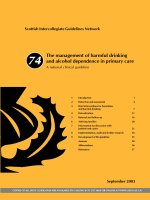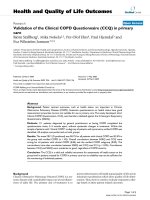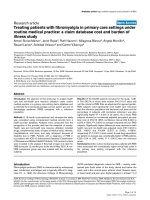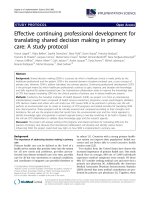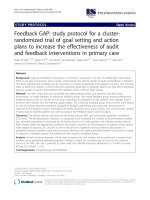Hoangthihangtackling disparities in influenza vaccination in primary care
Bạn đang xem bản rút gọn của tài liệu. Xem và tải ngay bản đầy đủ của tài liệu tại đây (289.67 KB, 18 trang )
TACKLING DISPARITIES IN
INFLUENZA VACCINATION IN
PRIMARY CARE: IT TAKES A TEAM
Hoàng Thị Hằng
WARM-UP
1.
2.
3.
4.
List current kinds of vaccine
Difference between “Vaccination”, “inoculation”
and “immunization”
What are the 3 aspects of prevention? Explain
Is influenza Vaccination necessary? Why/why
not?
Vaccine type
Vaccines of this type on U.S.
Recommended Childhood (ages 0-6)
Immunization Schedule
Live, attenuated
Measles, mumps, rubella (MMR combined
vaccine)
Varicella (chickenpox)
Influenza (nasal spray); Rotavirus
Inactivated/Killed
Polio (IPV); Hepatitis A
Toxoid (inactivated Diphtheria, tetanus (part of DTaP combined
toxin)
immunization)
Subunit/conjugate
Hepatitis B
Influenza (injection)
Haemophilus influenza type b (Hib)
Pertussis (part of DTaP combined
immunization)
Pneumococcal; Meningococcal
1.
VSuboptimal
OCABULARY
(a) of less than the best standard/quality
Ex: a score of 6 is optimal, less than 5 is suboptimal.
2. Disparity (n): difference
3. Uptake (n): the use of sth
4. Caveat /ˈkæviæt/ (n) a warning
5. Scenario (n); a description of things may happen
6. Hypothetical (a) possible
7. Sequential (a): following time/order
(Sequence)
9. Nest (v): to group
10. Account for: take up
11. Invariable (a): always the same, never changing
12. Mutable(a): that can change, likely to change
mutate
13. Conundrum /kəˈnʌndrəm/ a question
14. Entail (v): involve (the job entails a lot of hard work)
15. Designate (v) to assign job
16. Champion (v) to speak in support of sb
17. Embed (v): to fix sth into sth else
18. Huddle (v) to gather together
19. Eligible /ˈelɪdʒəbl/ (a): able to have sth (Only
those over 70 are eligible for the special
payment.)
20. Outreach (n) program
21. Debrief (v) to ask SO questions officially
22. Impending (a) that is going to happen very soon
FEASIBLE
ENTAIL
EMBED
ELIMINATE
IMPENDING
1. An operation to remove glass that was _______ in
his leg.
2. This diet claims to __________ toxins from the
body.
3. The job in the hospital ________ a lot of hard
work
4. There is likely to have an __________ shift toward
EBM.
5. It's just not _______ to manage the business on a
part-time basis
ADAMANT
MUTABLE PROACTIVE
SCENARIO
1.
2.
3.
4.
Managers must be ______ in identifying and
preventing potential problems.
As the virus is ______, you need to be vaccinated.
The government remained ________ that there
was no more money available.
The worst-case ______ is that they need to close
the clinic.
MAIN POINTS
Paragraph 1: General view
Paragraph 2: introduction
Paragraph 3: How the research was carried out
Paragraph 4: caveats accompanying the findings
Paragraph 5: key barriers & facilitators among minority
pts
Paragraph 6: pts’ cultural attitudes in disparities in
influenza vaccination
Paragraph 7: skeptical pts’ attitudes- refusal of a
vaccination
Paragraph 8,9,10, 11, 12: science of teamwork’s guidance
Paragraph 13: conclusion
READ & TAKE NOTES
Group 1: read paragraphs 1 7
Group 2: Read paragraphs 1,2,3, 8 12
CAVEATS
1.
2.
3.
Internet surveys omit those with lower web
access
Pt’s response to a hypothetical scenario not
reflect how they actually act.
Not account for No of office visits
KEY BARRIERS & FACILITATORS AMONG
MINORITY PTS
1.
2.
Primary care key source minority groups
Sequential & nested barriers at Community,
provider, & pt level
1.
2.
Community barriers: access to affordable
insurance, availability of primary care physician &
language access.
Vaccination rates reflects: pt- primary care health
care team
PT’S CULTURAL ATTITUDES IN DISPARITIES
IN INFLUENZA VACCINATION
1.
2.
3.
4.
Racial & ethnic minorities: less favorable
attitudes less seek out/request vacc.
Pt requests affect clinicians’ behavior (tests,
referrals, prescriptions, preventive services)
Few clinicians not to administer the vaccines
even pts request
During busy visits primary care physicians
neglect vacc,
SKEPTICAL PT ATTITUDES
1.
2.
3.
pts: refuse, reconsider and informed discussion
& shared decision-making
Miss opportunity = failing to explore a pt’s
concern & beliefs
Pt’ attitudes & beliefs: be mutable
GUIDANCE
1.
Leadership & commitment from primary care clinicians
improved vaccination rates for minority pts
organized systems for improving rates oof vaccination
regular meetings with reports
address cultural barriers
2. Using alerts
Embedded with electronic health record
alerts should be coupled to standing orders
staff qualifications, state law
3. Outreach to pts improve rates and reduce
disparities.
Outreach is coupled to others interventions,
effect dramatic
4. Emergence of accountable care organization
creates opportunities for better primary care _
public health.
->> local campaigns minority communities
provision of influenza vaccinations within
schools, work places, churches

